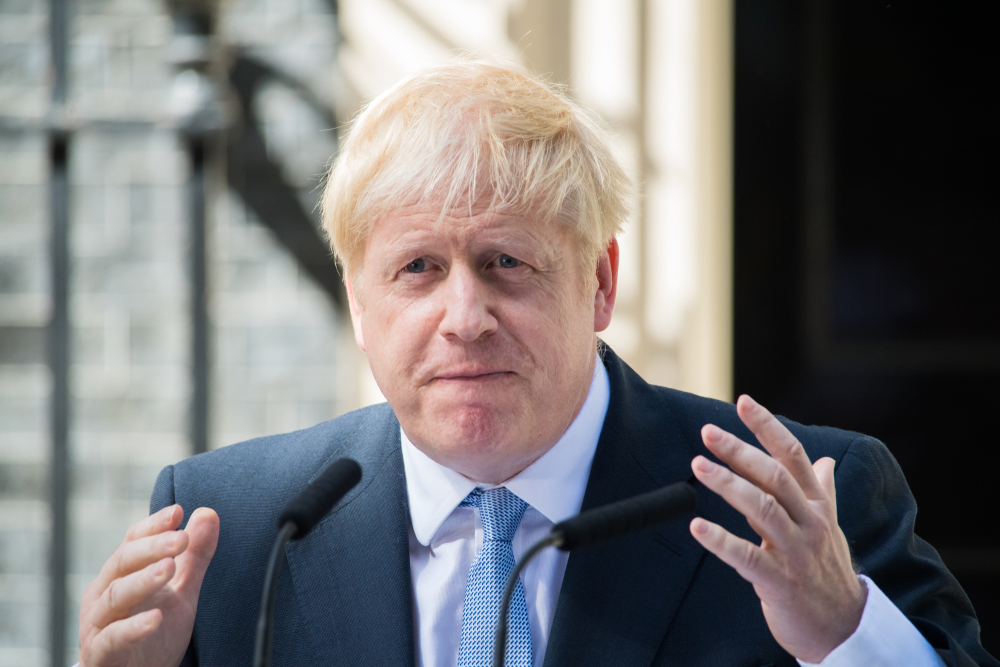Boris Johnson visited the Swaminarayan temple in Neasden, north London, on Saturday where the British Prime Minister spoke of his “great relationship with Narendrabhai”, said he was “concerned by anti-Hindu and anti-India sentiment”, revealed he was “determined to strengthen relations between the UK and India” and pledged he would stand shoulder to shoulder in “the fight against cross-border terrorism”.
He set out his India policy in some detail, explaining how the new Australian-style points-based immigration system and especially “NHS visas” would particularly benefit Indian doctors, nurses and other health professionals.
Boris was accompanied by his girlfriend Carrie Symonds, who donned a sari — a dazzling red silk affair — probably for the first time.
Also in the Prime Minister’s retinue were a number of senior Indian Tories whom Boris picked out for special mention, including Priti Patel — “this country’s first ever British Indian home secretary”.
“She’s a brilliant home secretary — she’s going to put lots more police on the streets, believe me, and look after the security of this wonderful mandir, believe me,” he threw in.
There were also references to two other Indian members of the cabinet — Rishi Sunak, chief secretary to the treasury, and international development secretary Alok Sharma.
“But also in Parliament we have the best in Lord (Dolar) Popat, Lord Gadhia — Jitesh, my friend — Lord (Rami) Ranger, (MP) Shailesh Vara, an old friend of mine — who have all been fantastic trail blazers in the British Indian community. And with your help I am looking forward to seeing more British Indian role models like them being elected to Parliament this Thursday.
“At every turn British Indians are making our country more prosperous, healthier, more generous and more secure.”
With only four days to go before the general election on December 12, he made a pitch for the support of British Indian voters who might make a difference in between 20 and 40 marginals.
It is fair to say he was given a rapturous reception, as he assured his audience: “I can tell you that the Conservative Party is your friend — we are, after all, the only party — I’ve checked — to refer specifically to India in our election manifesto.”
He went on: “And other politicians — I won’t say who — have suggested that Prime Minister Modi should actually be banned from coming to the UK. I won’t mention their names.”
He didn’t need to. Labour leader Jeremy Corbyn did make such a call when Modi was the chief minister of Gujarat but did meet him when the latter visited the UK as Prime Minister in November 2015.
The Gujaratis in the UK, who are involved in running businesses, large and small, are not necessarily all fervent BJP supporters but embrace Modi as a fellow member of the community.
The temple in Neasden, thought to be the biggest outside India, “is just one example of your community’s immense contribution”, said Johnson.
“To all British Indians I want to express my admiration and respect for everything you do for our country — quite simply the UK would be lesser in so many ways without you. And I am proud that we have hugely talented British Indians running our most successful businesses, providing the backbone of our National Health Service, leading our scientific research, volunteering for charities, serving in our armed forces and police forces and, of course, serving alongside me in my cabinet table.”
Johnson, who spent two and a half hours at the temple and met Indians who had come from all parts of the UK, was repeatedly cheered as he set out his thinking on India and Indians.
“Many, including myself, believe that British Indians played a vital role in helping the Conservatives to win elections in the past.
“When I said this to Prime Minister Modi, whom I know well, he simply laughed and he said what Narendrabhai always says, ‘The Indians are always on the winning side.’ And he’s right — I hope, I hope.”
Johnson developed what he considers an important aspect of his foreign policy. Other than by liberalising immigration rules, “I am determined to strengthen relations between the UK and India in other ways. I know that Prime Minister Modi is building a new India and we in the UK government will support him fully in his endeavour.
“I have a great relationship with Narendrabhai and we had good discussions during the G7 meeting in August and I want to visit India — if I get re-elected with a working majority I want to visit India at the earliest opportunity next year to strengthen further what the Prime Minister called ‘the living bridge’ between the UK and India. And you are that living bridge which unites our two great countries.
“In future we will have the chance to strengthen those trading ties even further. And it’s not just the economic and trading ties which are important but all the other dimensions in terms of our cooperation, including security — the fight against cross-border terrorism. And we stand shoulder to shoulder in the fight against terrorism. I say we should be working constructively together and, more broadly, I am concerned by anti-Hindu and anti-India sentiment.
“And if you remember only one thing I say today I hope it is this — you are a wonderful, successful and respected community. We value your presence as friends, as family — speaking personally, speaking personally — as family, as colleagues and neighbours and there can be no place for racism or anti-India sentiment of any kind in this country. As Prime Minister I will continue to fight for everyone’s right to be free from racism, discrimination and prejudice.'











